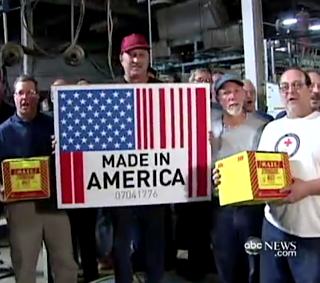 Industrial production in the U.S. surged in April, with the data from factories, mines and utilities rising 1.1 percent, the strongest gain since December 2010 and well above expectations.
Industrial production in the U.S. surged in April, with the data from factories, mines and utilities rising 1.1 percent, the strongest gain since December 2010 and well above expectations.
The Federal Reserve said Wednesday there were gains across the board. Factory activity alone rose 0.6% in April, boosted by the robust auto industry, which increased 3.9%. Production of high-tech goods rose 2.3%
Over the past 22 months, if you dive into the numbers, you’ll notice several positive manufacturing trends, according to a new government report (downloadable PDF):
- Business investment is up, growing by 18 percent since the end of 2009
- The U.S. is exporting more goods and services to the rest of the world. (As of October, exports totaled $2 trillion — an increase of almost 32 percent above the level in 2009.)
- The manufacturing sector is recovering the fastest. (In the past two years, the economy has added 334,000 manufacturing job, and that’s the strongest two-year period of manufacturing growth since the 1990s.)
After decades of watching American companies take jobs to other countries, we’re beginning to see entrepreneurs and manufactures make the decision to keep factories and production facilities here in the United States—or even bring jobs back to the U.S. from overseas.
In April, Caterpillar said it had added 6,500 U.S. jobs in the past year. GE says it has added 14,000 jobs in the U.S. since 2009, expanding U.S. factories that make appliances, locomotives and other products.
We’ve also seen manufacturers bring jobs back from overseas, as labor costs increase there.
In 2010, KEEN, the footwear designer, opened a 15,000-square-foot facility to manufacture boots in Portland, Oregon—moving production from China to a location just five miles from its corporate headquarters. The company also makes bags in California and socks in North Carolina.
After watching costs rise in its Chinese factories, Master Lock began bringing production back to Milwaukee—the same place where the company was founded in 1921.
And it’s not just manufacturers. Service firms are deciding to invest in the U.S. — even foreign-domiciled firms are taking advantage of American productivity and innovation. Siemens, for example, spends nearly $50 million each year training its U.S. workforce, and ThyssenKrupp spent nearly $5 billion on its new steel and stainless steel manufacturing and processing plant in Alabama. Investments from companies like these reached $228 billion in 2010, an increase from $153 billion in 2009.
“The healthy pick-up in output during 2012 so far (is) consistent with our view that GDP growth will pick up from the near-2% pace recorded in the first quarter,” said Peter Newland, economist at Barclays Capital, in a note to clients.



















